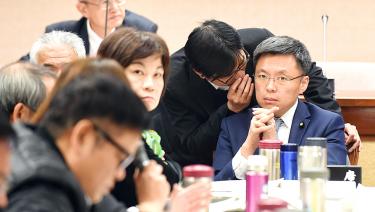Legislative body agrees on vital parts of referendum bill
THRESHOLD LOWEREDThe Internal Administration Committee reach a consensus to allow a referendum outcome to be considered passed by a majority where more than one-quarter of the electorate submit a valid vote
By Hsiao Ting-fangand Jonathan Chin / Staff reporter, with staff writer
Reviewing proposed amendments to the Referendum Act (公民投票法) yesterday, the Legislative Yuan’s Internal Administration Committee reached a consensus on lowering the voting age, the voting thresholds and the required vote for passage, but failed to agree on articles pertaining to territory changes and cross-strait political negotiations.
The committee passed the proposal to lower the age requirement for referendum voters stipulated by Article 7 of the act, from 20 to 18, after deliberating for one minute, incorporating it into the bill that is to be submitted to the legislature’s general assembly.
An amendment requiring cross-strait political negotiations to be authorized and ratified by referendum, and another making provisions for holding a referendum to amend the constitutional definition of Taiwan’s territories were shelved.
The committee said that lawmakers are to resume deliberations on the two proposals after they have completed the review of other less controversial items.
The proposal requiring cross-strait political negotiations to be authorized and ratified by referendum stalled down after government representatives and several committee members voiced their opposition.
According to the proposal, the government must be authorized by a referendum to initiate political negotiations with Beijing. The agreement must be passed by the legislature with the support of a three-quarters majority of attending lawmakers and three-quarters of all lawmakers must be present for the vote.
After a cross-strait agreement is passed by the legislature, it has to be submitted for a public referendum for ratification. The agreement can only be ratified if it has the support of more than half of the nation’s eligible voters in a valid ballot.
The government is opposed to the amendment because it says the proposal is an infringement on the presidents prerogative to conduct cross-strait political negotiations, Executive Yuan Secretary-General Chen Mei-ling (陳美伶) told the committee.
Chen’s statement is a reversal of the Democratic Progressive Party’s (DPP) previous comments in favor of the proposal.
Rules governing political talks with Beijing should fall under the Act Governing Relations Between the People of the Taiwan Area and the Mainland Area (臺灣地區與大陸地區人民關係條例), and the high threshold of the ratification process in the legislature and by the referendum are unreasonable impediments to cross-strait relations and possible agreements, People First Party (PFP) Legislator Chen Yi-chieh (陳怡潔) said.
DPP Legislator Lee Chun-yi (李俊俋) also said oversight set for cross-strait talks should be provided by amending the Act Governing Relations Between the People of the Taiwan Area and the Mainland Area, and the issue “should not be discussed in isolation.”
“The integrity of the legislative process must take precedence over political considerations,” New Power Party (NPP) Legislator Hsu Yung-ming (徐永明) said, adding he is not convinced that scrapping the amendment would improve cross-strait relations.
Proposals to enable territorial changes via referendum by amending Article 2 of the Referendum Act were another bone of contention with DPP and NPP lawmakers submitting separate drafts that included the provision.
“Redefining the nation’s territories should be excluded from the amendments proposed to the Referendum Act or we risk contravening the Sixth Amendment of the Republic of China Constitution (ROC), which has established constraints on the legal processes needed to make changes to ROC territories,” Chen said.
Lee said changes in the definition of national territories should be made by amending the Constitution and not by amending the act.
A failure to include the power to redefine national territories in the act would exacerbate the divergence between legal theory and practice, because while having referendum rights is a demonstration that sovereignty lies in the people, the Constitution has no articles on how this right is to be exercised, and if “territorial change” is not an item that can be put to a referendum, the rights granted by the Constitution cannot be substantiated, NPP Legislator Huang Kuo-chang (黃國昌) said.
While the Chinese Nationalist Party (KMT) has always been against voting on territory-related issues, KMT Legislator Huang Chao-shun (黃昭順) did not oppose the proposal yesterday, saying; “The KMT knows how to roll with a good thing.”
The proposals to lower the signature threshold from 0.5 percent to 0.01 percent of the electorate to initiate a referendum proposal and to lower the threshold to put a referendum proposal to the vote from 5 percent to 1.5 percent of the electorate, also had the support of lawmakers across party lines. The committee reached a consensus to allow a referendum outcome to be considered passed when the number of yes votes reaches that of one-quarter of the electorate and the number of yes votes is more than that of nay votes.

No comments:
Post a Comment